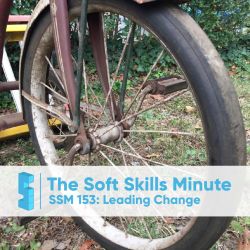Share

Serious Soft Skills
Podcast 4: New Soft Skills Research Revealed
•
Hosts Dr. Tobin Porterfield and Bob Graham share some cutting-edge research on soft skills we obtained from a survey of almost 500 business people. They further dig into results among various groups, including people seeking jobs, workers without leadership roles, mid-level managers, executives, and the self-employed. It’s great stuff that will give you new insights on soft skills.
Bob Graham ‘0:00’: Coming up, we will share some cutting-edge research on soft skills we obtained from a survey of almost 500 business people. It’s great stuff that will give you new insights into how soft skills are really being used in the workplace. That and more in just a few seconds.
Graham ‘0:28’: Welcome to Episode 4 of Serious Soft Skills. I am Bob Graham, and with me, as always, is Dr. Tobin Porterfield. We each teach college, we collaborate on researching soft skills, and we both have used and seen others use soft skills in various jobs over our careers. We think our experience and expertise give us a unique lens for looking at soft skills.
Graham ‘0:59’: So today, Toby, we are going to do things a little differently. We’re going to talk about some research we have done in the field of soft skills that we have only released to a list of very few people. So this is breaking news. If I had a glass, I would break it. This is big stuff.
Why This Research Matters
Graham ‘1:29’: Before we get into the research, Toby, why don’t you set up for people what the research found. Of course, whenever you are looking at research, the first question is who did you ask the questions to? Can you walk through how we got this data we are about to share?
Dr. Tobin Porterfield ‘1:45’: Bob, I am going to throw you a curve ball because I think we need to actually take a step further back because one of the problems with research is you have to cover why. Otherwise, you can look at all these results and people say, “Who cares?” Let me frame it up with why we even got into this and why we reached out to our network for some answers. It started with us looking around. As we were developing that sensitivity to soft skills, we’d have observations. We’d say that we had seen leadership do this and I see the importance of communication. We usually refer to these as anecdotal or experiential evidence. We get these little snippets. They almost turn into sound bites that you might hear on the news. We’ve even seen this in news clippings. We start to pull all these pieces together, but as people who look at research, we have to stop and say, “Hold it. Is that really a unique experience I have had and it doesn’t apply to anyone else, anywhere else?” That is what brought us to doing the survey and reaching out to our network to ask the question and validate that soft skills are really important, which soft skills are important, and who are they important for.
Porterfield ‘3:06’: Our initial survey did that and it cleared up a lot of items and it brought some focus in. It also motivated us to say this kind of work needs to be done. Back to the survey. Bob, can you give us a little background on how we reached out to collect that data?
How We Found Participants
Graham ‘3:24’: We went new school, I would say. In the past you would try to find people to do surveys by mail or by fax, and I can remember doing some surveys that way. But here, we actually used some new stuff called social media and email. We leveraged LinkedIn. We used databases we each have of LinkedIn connections. Those connections we sent an email to asking them to fill out a short survey. It took less than five minutes. It wasn’t real long and involved. We also posted it on social media, on our Facebook pages, on LinkedIn and on Twitter. We got really good response there. And we did some networking, one of the soft skills. I sent it out to a few people in my network, who were kind enough to share with their networks...
More episodes
View all episodes

SSM 158: Details, details, details
02:05Tobin Porterfield discusses the soft skill of paying attention to details.
75 Coaching With Neal Woodson Part 1
15:45Bob Graham interviews author, trainer, and expert coach Neal Woodson Part 1
SSM 157: Defaulting
03:11Bob discusses the power of defaulting to YES rather than immediately saying NO
SSM 156: Pivoting
03:02Bob Graham discusses how that you need to know when to alter you agenda. Even what works for years may need to change for long term success.


SSM 153: Leading Change
03:08If you are ready for a change - you might have to lead it - on today's podcast
